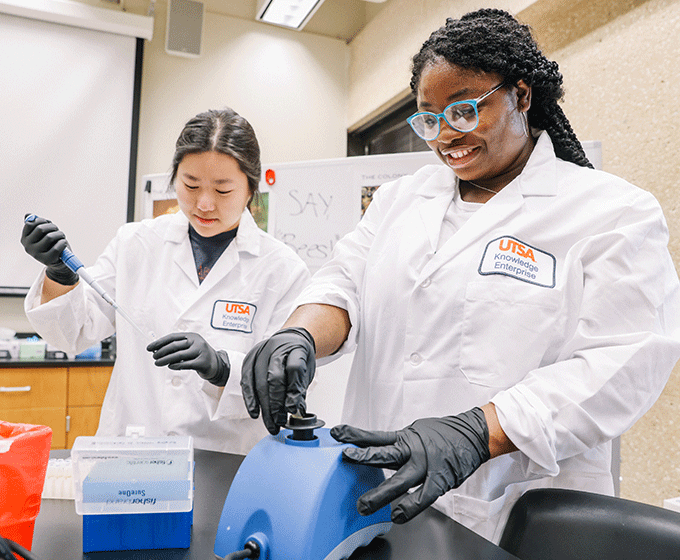Posted on September 20, 2023 by The Graduate School

SEPTEMBER 19, 2023 — UTSA has received a five-year grant to develop a more inclusive workforce seeking to join the professoriate in higher education’s science, technology, engineering and mathematics (STEM) disciplines. The award, intended to attract underrepresented faculty through focused mentoring and support, is part of a larger, $3.2 million grant given to an alliance of five academic institutions in The University of Texas System.
In the STEM disciplines, recruitment and retention of employees from different backgrounds has been and continues to be a challenge in the United States. This is especially true in higher education where few people from underrepresented backgrounds join the faculty ranks.
Through the National Science Foundation’s Alliances for Graduate Education and the Professoriate (NSF AGEP) program, UTSA will help The University of Texas System recruit and retain advanced doctoral students, postdoctoral fellows and junior faculty through the tenure and promotion process, a challenge prevalent in higher education.
The Texas program will include 100 individuals. About 15 will be from UTSA. Participants will receive mentoring to tackle systemic barriers. Throughout the mentorship period, the participants' experiences will be documented to analyze the training’s effectiveness.
Zachary Tonzetich, UTSA associate professor of chemistry, will be the Principal Investigator (PI) for the UTSA project, and Ambika Mathur, Senior Vice Provost for Graduate and Postdoctoral Studies and dean of The UTSA Graduate School, will be the co-PI.
“UTSA aspires to become a model for student success, a great public research university, and an exemplar for strategic growth and innovative excellence,” Mathur said. “We are appreciative of the National Science Foundation for recognizing the need to ensure our post-doctoral fellow and junior faculty pipeline remains inclusive. This program is well aligned with the mission and core values of UTSA and will have a broad economic and intellectual impact on San Antonio and our community.”
The AGEP supports higher education alliances with strategies in place to increase the number of historically underrepresented STEM faculty and promote systemic change.
“UTSA’s participation in the AGEP alliance will provide our graduate students and trainees with focused training and support to help them achieve their goal of joining STEM faculties in the UT System,” Tonzetich said. “The program will ensure that the 21st century academic workforce better reflects the broad backgrounds and experiences of our future undergraduate students.”
UTSA’s share of the funding is $302,697. The remaining funds will be distributed among the lead institution, UT Arlington, and the other partner institutions: UT-Dallas, UT-El Paso and UT-Austin. All five schools are designated as Tier One universities. Four of the five, including UTSA, are also Hispanic Serving Institutions.

